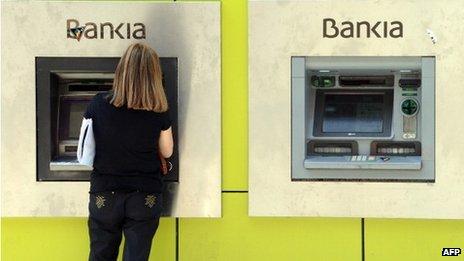Spain begins privatisation of bailed-out lender Bankia
- Published

Bankia's 19.2bn euro loss in 2012 was the worst in Spanish corporate history
Spain's government has started selling some of its stake in nationalised lender Bankia.
It issued an initial offer of shares on Thursday worth 7.5% of the bank.
The Spanish government owns 68% of the lender, having injected it with 18bn euros (£14.8bn) of EU-funded aid when a property crash brought the country to the brink of financial collapse.
Since then, Spain's biggest bailed-out bank has returned to profit, with shares up 29% so far this year.
It made 512m euros in 2013, compared with a loss of 19.2bn euros the previous year - the biggest loss in Spanish corporate history.
The government plans to sell off further small stakes this year, but no more than 18% in total, because it wants to maintain control for now.
Turnaround
"This is truly a sign of the shift in perception and of the reality of our financial system," said Spain's Economy Minister Luis de Guindos.
Bankia shares closed on Thursday at 1.58 euros each, implying a valuation of 1.36bn euros for the stake.
Its bailout in 2012 was part of a 41bn-euro aid package from the European Union, designed to rescue Spain's financial system.
The country was on the verge of defaulting on its debts, following the collapse of a long building and housing boom in 2008.
Spain's surviving banks have been forced to take steep losses and move toxic assets into a so-called "bad bank" set up by the government.
- Published24 April 2013
- Published28 February 2013
- Published28 November 2012
- Published9 June 2012